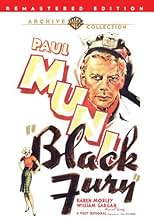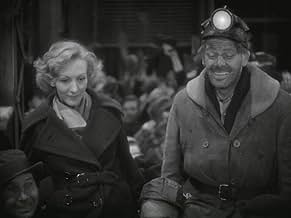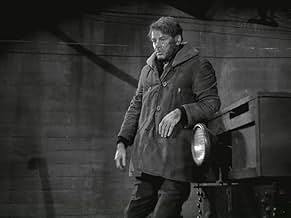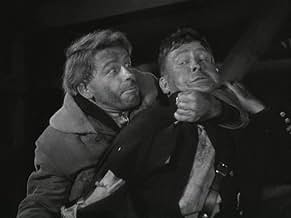IMDb RATING
6.5/10
1.1K
YOUR RATING
An immigrant coal miner finds himself in the middle of a bitter labor dispute between the workers and the mine owners.An immigrant coal miner finds himself in the middle of a bitter labor dispute between the workers and the mine owners.An immigrant coal miner finds himself in the middle of a bitter labor dispute between the workers and the mine owners.
- Nominated for 1 Oscar
- 2 wins & 2 nominations total
John Qualen
- Mike
- (as John T. Qualen)
J. Carrol Naish
- Steve
- (as J. Carroll Naish)
Joseph Crehan
- Farrell
- (as Joe Crehan)
Sara Haden
- Sophie Shemanski
- (as Sarah Haden)
G. Pat Collins
- Lefty - Company Policeman
- (as George Pat Collins)
Featured reviews
Joe Radek (Paul Muni) is a simple-minded, hardworking immigrant coal miner who dreams of buying a farm and settling down with his girl, Anna (Karen Morley). But when Anna leaves him for another man, Joe falls apart and takes to drinking. In Joe's current state of mind, he's manipulated by a union buster (J. Carrol Naish) into revolting against the mining company. This has disastrous results for the laborers but Joe determines to set things right by any means necessary.
Paul Muni's only film with director Michael Curtiz. As was often the case with Muni, his performance can be seen either as brilliant or 100% ham. Whichever it is, I enjoyed it a lot. The cast is full of reliable Warner Bros contract players that are always fun to watch, especially great character actor J. Carrol Naish. It's not surprising this is from WB, the 1930s home of movies about the working class. Certainly interesting from a historical and sociological perspective as a view of labor issues in Depression-era America. It's also fine dramatic entertainment. Based in part on a true story of a 1929 incident at a mine in Imperial Pennsylvania.
Paul Muni's only film with director Michael Curtiz. As was often the case with Muni, his performance can be seen either as brilliant or 100% ham. Whichever it is, I enjoyed it a lot. The cast is full of reliable Warner Bros contract players that are always fun to watch, especially great character actor J. Carrol Naish. It's not surprising this is from WB, the 1930s home of movies about the working class. Certainly interesting from a historical and sociological perspective as a view of labor issues in Depression-era America. It's also fine dramatic entertainment. Based in part on a true story of a 1929 incident at a mine in Imperial Pennsylvania.
10kcfl-1
Let's look at 1935: I don't think there's anyone reviewing now who went to the movies that year, so we have to rely on video. I've seen about 100 films from that year; many have not been preserved. "The Informer"won the Oscar, and a worthy film it was. "A Night at the Opera," "ChinaSeas," "The Good Fairy" "Lives of a Bengal lancer," "Naughty Marietta,"and "The Devil Is a Woman" also came out that year, all great films. "Black Fury" was better than any of them. It's gripping from the first frame to the last. It's as realistically set, and politically sensitive, as any Hollywood film. The closest political thriller I've seen to it is "Massacre" (1934). I loved it for the big factors, like digging itself into an impossible hole, then managing to escape, and Muni's performance. Also for the small ones, like all the supporting performances and the fact that the union happens to be integrated.
During the Thirties Warner Brothers had the reputation of being the working class studio and it was films like Black Fury that made for Warner Brothers that reputation. It was rare indeed to see another studio take stories about ordinary working people. Mostly they concentrated on the middle and upper classes because film was a form of escapism during the Depression. Black Fury coming out as it did in the middle of the New Deal was a timely reminder of the difficulties organized labor faced. Not coincidentally 1935 was the year that the Wagner Labor Relations Act was passed, an effort finally by the government to give labor some kind of equal footing with management. The need of the Wagner Act was to correct some of the abuses shown in films like Black Fury.
Paul Muni plays happy go lucky immigrant coal miner Joe Radek. A man admittedly who works hard and no one thinks of as any kind of brain. He gets used good and proper by the company to stir up the miners so they will strike and give the company an excuse to lock out the union and bring in scabs.
What you see with those miners living on subsistent wages in company towns was taken right from current headlines. It may be ancient history to us now, but it was very real for those people back in the day. The Pinkertons as represented by brutal and corrupt company policeman Barton MacLane had an unsavory reputation as strikebreakers and enforcers for management. That too is no exaggeration.
Muni, aided and abetted by former girl friend Karen Morley now seeing the error of some of her ways, sees what a chump he's been and takes some real direct action against the employers. It's spectacular I'll tell you that.
Though his acting style seems to have not worn well with some, not with me mind you, Muni was given a really rare tribute that year. His performance as Joe Radek was the second time a performer had a sustained write-in campaign for him for an acting Oscar. He finished second in the balloting to Victor McLaglen for The Informer and ahead of Mutiny of the Bounty nominees, Clark Gable, Charles Laughton, and Franchot Tone. The following year the Academy banned write-ins and that's been so ever since. Of course the following year Muni won his Oscar for The Story of Louis Pasteur.
We've moved on in America from an industrial to an information based society and films like Black Fury are now part of history. But it's a history we should not forget.
Paul Muni plays happy go lucky immigrant coal miner Joe Radek. A man admittedly who works hard and no one thinks of as any kind of brain. He gets used good and proper by the company to stir up the miners so they will strike and give the company an excuse to lock out the union and bring in scabs.
What you see with those miners living on subsistent wages in company towns was taken right from current headlines. It may be ancient history to us now, but it was very real for those people back in the day. The Pinkertons as represented by brutal and corrupt company policeman Barton MacLane had an unsavory reputation as strikebreakers and enforcers for management. That too is no exaggeration.
Muni, aided and abetted by former girl friend Karen Morley now seeing the error of some of her ways, sees what a chump he's been and takes some real direct action against the employers. It's spectacular I'll tell you that.
Though his acting style seems to have not worn well with some, not with me mind you, Muni was given a really rare tribute that year. His performance as Joe Radek was the second time a performer had a sustained write-in campaign for him for an acting Oscar. He finished second in the balloting to Victor McLaglen for The Informer and ahead of Mutiny of the Bounty nominees, Clark Gable, Charles Laughton, and Franchot Tone. The following year the Academy banned write-ins and that's been so ever since. Of course the following year Muni won his Oscar for The Story of Louis Pasteur.
We've moved on in America from an industrial to an information based society and films like Black Fury are now part of history. But it's a history we should not forget.
Paul Muni was one of the most acclaimed and respected actors of his era...so much so that he nearly won the Oscar for Best Actor...as a write-in candidate! And, I must admit that when Muni is on, he's great. But occasionally I see a performance and wonder why it was so beloved...such as his over-the-top Eastern European-American, Joe Radek, in "Black Fury". Now I am not saying it's a bad film...just his performance.
As for the story, it's an interesting tale of both a union and management being manipulated into striking....and Joe is an unwitting dupe in the process. But, being a decent sort of guy at heart, he does what anyone would do in this situation...blow up the mine! Well, at least that's the crazy message you get in this picture!
Overall, an engaging and interesting film with many flaws...including its leading man's performance and the crazy vigilante message it promotes. A genuinely odd but entertaining picture.
As for the story, it's an interesting tale of both a union and management being manipulated into striking....and Joe is an unwitting dupe in the process. But, being a decent sort of guy at heart, he does what anyone would do in this situation...blow up the mine! Well, at least that's the crazy message you get in this picture!
Overall, an engaging and interesting film with many flaws...including its leading man's performance and the crazy vigilante message it promotes. A genuinely odd but entertaining picture.
The fabulous Paul Muni gives another wonderful performance in this 1935 film.
With a genuine Slavic accent, Muni is superb as a coal miner who loses his girl (Karen Morley) to a company Policeman and goes on a drinking binge as a result. It is at this point that a gangster organization tries to create chaos within the union and Muni becomes their perfect foil.
J. Carrol Naish is excellent as the worker who works for this unholy organization.
Naturally, Muni's best friend is killed in a clash with company police and Muni, now sober, vows revenge.
Morley returns to Muni just in time as he goes down into the mine and starts blowing the place up. It's at this point that the film starts to go down, but with Muni's performance and the problems shown of what the coal miners had to endure plus the dishonesty in trying to break the union, all make for a very good film.
With a genuine Slavic accent, Muni is superb as a coal miner who loses his girl (Karen Morley) to a company Policeman and goes on a drinking binge as a result. It is at this point that a gangster organization tries to create chaos within the union and Muni becomes their perfect foil.
J. Carrol Naish is excellent as the worker who works for this unholy organization.
Naturally, Muni's best friend is killed in a clash with company police and Muni, now sober, vows revenge.
Morley returns to Muni just in time as he goes down into the mine and starts blowing the place up. It's at this point that the film starts to go down, but with Muni's performance and the problems shown of what the coal miners had to endure plus the dishonesty in trying to break the union, all make for a very good film.
Did you know
- TriviaThough it received no official Oscar nominations, the Academy permitted write-in candidates this year and when the voting order was announced it turned out that Paul Muni had come in second in the balloting, narrowly behind winner Victor McLaglen but ahead of any of the other nominated actors.
- GoofsAt c. 24 minutes Joe is counting out his money, but he is inconceivably inaccurate. After counting to 68 dollars he places two further bills on the table and counts "73" out loud. A few moments later he counts up to 75 dollars, but, after four more bills have been placed in front of him he announces "76" dollars as his total.
- ConnectionsFeatured in Hollywood and the Stars: The Angry Screen (1964)
- SoundtracksWhy Do I Dream Those Dreams?
(1934) (uncredited)
Music by Harry Warren
Played on piano in bar during scene where men challenge Radek
Details
- Release date
- Country of origin
- Language
- Also known as
- Black Fury
- Filming locations
- Warner Ranch, Calabasas, California, USA(mine shaft scenes)
- Production company
- See more company credits at IMDbPro
- Runtime
- 1h 34m(94 min)
- Color
- Sound mix
- Aspect ratio
- 1.37 : 1
Contribute to this page
Suggest an edit or add missing content

























